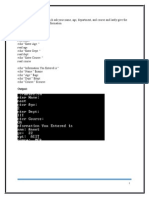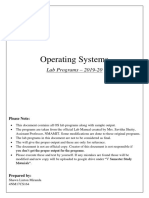0% found this document useful (0 votes)
106 views17 pagesOperating System Lab: Presented By: Abhishek Ghosh Cse 3 Year Roll - 38
Here is a C program to implement the single producer single consumer problem:
#include <stdio.h>
#include <stdlib.h>
#include <unistd.h>
#include <pthread.h>
#define SIZE 5
int buffer[SIZE];
int in = 0;
int out = 0;
pthread_mutex_t mutex;
pthread_cond_t not_full;
pthread_cond_t not_empty;
void *producer() {
int i = 0;
while(1) {
pthread_mutex_lock(&mutex);
while((in-out+SIZE)%SIZE == SIZE)
pthread
Uploaded by
Madhurima LahiriCopyright
© Attribution Non-Commercial (BY-NC)
We take content rights seriously. If you suspect this is your content, claim it here.
Available Formats
Download as RTF, PDF, TXT or read online on Scribd
0% found this document useful (0 votes)
106 views17 pagesOperating System Lab: Presented By: Abhishek Ghosh Cse 3 Year Roll - 38
Here is a C program to implement the single producer single consumer problem:
#include <stdio.h>
#include <stdlib.h>
#include <unistd.h>
#include <pthread.h>
#define SIZE 5
int buffer[SIZE];
int in = 0;
int out = 0;
pthread_mutex_t mutex;
pthread_cond_t not_full;
pthread_cond_t not_empty;
void *producer() {
int i = 0;
while(1) {
pthread_mutex_lock(&mutex);
while((in-out+SIZE)%SIZE == SIZE)
pthread
Uploaded by
Madhurima LahiriCopyright
© Attribution Non-Commercial (BY-NC)
We take content rights seriously. If you suspect this is your content, claim it here.
Available Formats
Download as RTF, PDF, TXT or read online on Scribd
/ 17






















































































